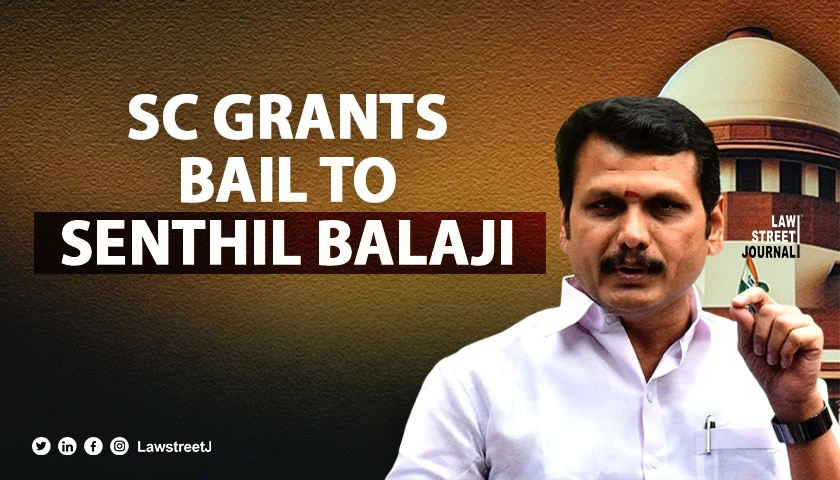NEW DELHI: The Supreme Court on Thursday granted bail to former Tamil Nadu minister V Senthil Balaji in connection with a money laundering case, holding constitutional courts cannot allow the Enforcement Directorate to use stringent bail conditions as a tool to incarcerate an accused without trial in violation of his fundamental right to speedy trial.
A bench of Justices Abhay S Oka and Augustine George Masih ordered release of MLA and DMK leader Balaji, arrested on June 14, 2923 in cases, arising out of cash for jobs scam, on bail after noting his 15 months of custody with no possibility of completion of trial in a few years.
The court said the requirement of expeditious disposal of cases must be read into the special statutes, including the Prevention of Money Laundering Act, as inordinate delay in the conclusion of the trial and the higher threshold for the grant of bail cannot go together.
The top court said the constitutional courts cannot allow provisions like Section 45(1)(ii) (containing stringent conditions of bail) of the Prevention of Money Laundering Act to become instruments in the hands of the Enforcement Directorate to continue incarceration for a long time when there is no possibility of a trial of the scheduled offence and the PMLA offence concluding within a reasonable time.
In its judgment, the bench also observed some day, the courts, especially the Constitutional Courts, will have to take a call on a peculiar situation that arises in our justice delivery system.
"There are cases where clean acquittal is granted by the criminal courts to the accused after very long incarceration as an undertrial. When we say clean acquittal, we are excluding the cases where the witnesses have turned hostile or there is a bona fide defective investigation. In such cases of clean acquittal, crucial years in the life of the accused are lost. In a given case, it may amount to violation of rights of the accused under Article 21 of the Constitution which may give rise to a claim for compensation," the bench said.
Senior advocates Mukul Rohatgi and Sidharth Luthra, appearing for Balaji submitted the trial of the scheduled offences and, consequently, the PMLA offence is not likely to be completed in three to four years or even more.
"If the appellant's detention is continued, it will amount to an infringement of his fundamental right under Article 21 of the Constitution of India of speedy trial," the bench said.
The bench noted Solicitor General Tushar Mehta on behalf of the Enforcement Directorate contended the appellant enjoyed influential position in the State, which may have resulted in a so called compromise between the bribe givers and the bribe takers.
Considering the apprehension of the appellant tampering with the evidence, stringent conditions must be imposed, the bench said.
In view of stringent conditions of bail in special statutes including PMLA, the bench said the expeditious disposal of the trial is also warranted considering the higher threshold set for the grant of bail.
"Hence, the requirement of expeditious disposal of cases must be read into these statutes. Inordinate delay in the conclusion of the trial and the higher threshold for the grant of bail cannot go together," the bench said.
The court underscored that it is a well settled principle of our criminal jurisprudence that “bail is the rule, and jail is the exception.”
The court relied upon K A Najeeb case which held the stringent provisions for the grant of bail do not take away the power of Constitutional Courts to grant bail on the grounds of violation of Part III of the Constitution.
"If the Constitutional Courts do not exercise their jurisdiction in such cases, the rights of the undertrials under Article 21 of the Constitution of India will be defeated," the bench said.
The court felt when the trial of the complaint under PMLA is likely to prolong beyond reasonable limits, the Constitutional Courts will have to consider exercising their powers to gr nt bail.
"The reason is that Section 45(1)(ii) does not confer power on the State to detain an accused for an unreasonably long time, especially when there is no possibility of trial concluding within a reasonable time," it said.
The Madras High Court had on February 28, 2024 declined to provide relief to Balaji.
It was stated between 2011 and 2016, the appellant was holding the post of Transport Minister in the Government of Tamil Nadu. While discharging his duties as a Minister, in connivance with his personal assistant and his brother, he allegedly collected large amounts by promising job opportunities to several person in various positions in the Transport Department.
In its order, the court directed him to furnish a bond of Rs 25 lakh with two sureties of the like amount. It directed Balaji not to contact victims directly or indirectly or it may be a ground to cancel the bail.
Among other conditions, the court directed him to mark his attendance every Monday and Friday between 11 am and 12 noon in the office of the Deputy Director, the Directorate of Enforcement at Chennai. He should also appear on the first Saturday of every calendar month before the investigating officers of the three scheduled offences and should regularly and punctually appear before the trial court, dealing with the cases. He was also told to surrender passport.
[Read Judgment]















